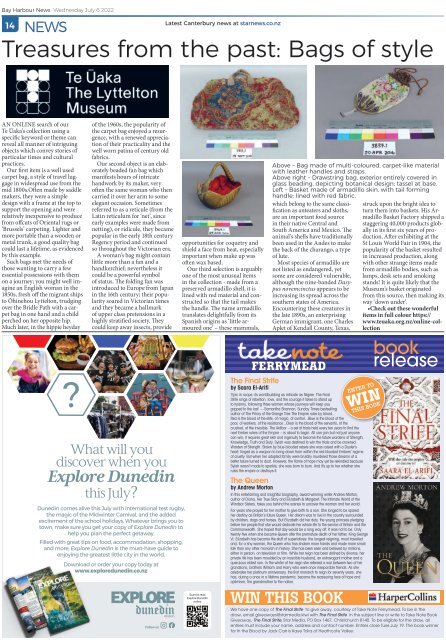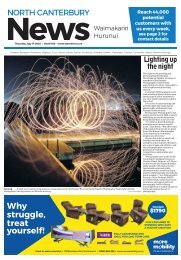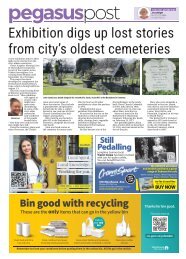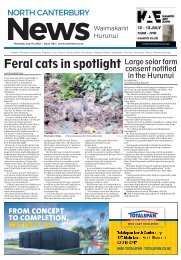Bay Harbour: July 06, 2022
Transform your PDFs into Flipbooks and boost your revenue!
Leverage SEO-optimized Flipbooks, powerful backlinks, and multimedia content to professionally showcase your products and significantly increase your reach.
<strong>Bay</strong> <strong>Harbour</strong> News Wednesday <strong>July</strong> 6 <strong>2022</strong><br />
14<br />
NEWS<br />
Latest Canterbury news at starnews.co.nz<br />
Treasures from the past: Bags of style<br />
AN ONLINE search of our<br />
Te Ūaka’s collection using a<br />
specific keyword or theme can<br />
reveal all manner of intriguing<br />
objects which convey stories of<br />
particular times and cultural<br />
practices.<br />
Our first item is a well used<br />
carpet bag, a style of travel luggage<br />
in widespread use from the<br />
mid 1800s.Often made by saddle<br />
makers, they were a simple<br />
design with a frame at the top to<br />
support the opening and were<br />
relatively inexpensive to produce<br />
from offcuts of Oriental rugs or<br />
‘Brussels’ carpeting. Lighter and<br />
more portable than a wooden or<br />
metal trunk, a good quality bag<br />
could last a lifetime, as evidenced<br />
by this example.<br />
Such bags met the needs of<br />
those wanting to carry a few<br />
essential possessions with them<br />
on a journey; you might well imagine<br />
an English woman in the<br />
1850s, fresh off the migrant ships<br />
to Ōhinehou Lyttelton, trudging<br />
over the Bridle Path with a carpet<br />
bag in one hand and a child<br />
perched on her opposite hip.<br />
Much later, in the hippie heyday<br />
of the 1960s, the popularity of<br />
the carpet bag enjoyed a resurgence,<br />
with a renewed appreciation<br />
of their practicality and the<br />
well worn patina of century old<br />
fabrics.<br />
Our second object is an elaborately<br />
beaded fan bag which<br />
manifests hours of intricate<br />
handwork by its maker, very<br />
often the same woman who then<br />
carried it over her arm to some<br />
elegant occasion. Sometimes<br />
referred to as a reticule (from the<br />
Latin reticulum for ‘net’, since<br />
early examples were made from<br />
netting), or ridicule, they became<br />
popular in the early 18th century<br />
Regency period and continued<br />
so throughout the Victorian era.<br />
A woman’s bag might contain<br />
little more than a fan and a<br />
handkerchief; nevertheless it<br />
could be a powerful symbol<br />
of status. The folding fan was<br />
introduced to Europe from Japan<br />
in the 16th century; their popularity<br />
soared in Victorian times<br />
and they became a hallmark<br />
of upper class pretensions in a<br />
highly stratified society. They<br />
could keep away insects, provide<br />
opportunities for coquetry and<br />
shield a face from heat, especially<br />
important when make up was<br />
often wax based.<br />
Our third selection is arguably<br />
one of the most unusual items<br />
in the collection - made from a<br />
preserved armadillo shell, it is<br />
lined with red material and constructed<br />
so that the tail makes<br />
the handle. The name armadillo<br />
translates delightfully from its<br />
Spanish origins as ‘little armoured<br />
one’ – these mammals,<br />
Above – Bag made of multi-coloured, carpet-like material<br />
with leather handles and straps.<br />
Above right – Drawstring bag, exterior entirely covered in<br />
glass beading, depicting botanical design; tassel at base.<br />
Left – Basket made of armadillo skin, with tail forming<br />
handle; lined with red fabric.<br />
which belong to the same classification<br />
as anteaters and sloths,<br />
are an important food source<br />
in their native Central and<br />
South America and Mexico. The<br />
animal’s shells have traditionally<br />
been used in the Andes to make<br />
the back of the charango, a type<br />
of lute.<br />
Most species of armadillo are<br />
not listed as endangered, yet<br />
some are considered vulnerable,<br />
although the nine-banded Dasypus<br />
novemcinctus appears to be<br />
increasing its spread across the<br />
southern states of America.<br />
Encountering these creatures in<br />
the late 1890s, an enterprising<br />
German immigrant, one Charles<br />
Aplet of Kendall County, Texas,<br />
Ferrymead<br />
The Final Strife<br />
by Saara El-Arifi<br />
‘Epic in scope, its worldbuilding as intricate as filigree. The Final<br />
Strife sings of rebellion, love, and the courage it takes to stand up<br />
to tyranny, following three women whose journeys will keep you<br />
gripped to the last’ —Samantha Shannon, Sunday Times bestselling<br />
author of The Priory of the Orange Tree The Empire rules by blood...<br />
Red is the blood of the elite, of magic, of control...Blue is the blood of the<br />
poor, of workers, of the resistance...Clear is the blood of the servants, of the<br />
crushed, of the invisible. The Aktibar – a set of trials held every ten years to find the<br />
next Ember rulers of the Empire – is about to begin. All can join but not just anyone<br />
can win; it requires great skill and ingenuity to become the future wardens of Strength,<br />
Knowledge, Truth and Duty. Sylah was destined to win the trials and be crowned<br />
Warden of Strength. Stolen by blue-blooded rebels she was raised with a Duster’s<br />
heart; forged as a weapon to bring down from within the red-blooded Embers’ regime<br />
of cruelty. But when her adopted family were brutally murdered those dreams of a<br />
better future turned to dust. However, the flame of hope may yet be rekindled because<br />
Sylah wasn’t made to sparkle, she was born to burn. And it’s up to her whether she<br />
rules the empire or destroys it.<br />
The Queen<br />
by Andrew Morton<br />
In this entertaining and insightful biography, award-winning writer Andrew Morton,<br />
author of Diana, Her True Story and Elizabeth & Margaret: The Intimate World of the<br />
Windsor Sisters, takes you behind the scenes to uncover the woman and her world.<br />
ENTER TO<br />
WIN<br />
THIS BOOK<br />
For years she prayed for her mother to give birth to a son. She longed to be spared<br />
her destiny as Britain’s future Queen. Her dream was to live in the country surrounded<br />
by children, dogs and horses. But Elizabeth did her duty, the young princess pledging<br />
before her people that she would dedicate her whole life to the service of Britain and the<br />
Commonwealth. She hoped that day would be a long way off. It was not to be. Only<br />
twenty-five when she became Queen after the premature death of her father, King George<br />
Vl, Elizabeth has become the stuff of superlatives: the longest reigning, most travelled<br />
and, for a shy woman, the Queen who has shaken more hands and made more small<br />
talk than any other monarch in history. She has been seen and believed by millions,<br />
either in person, on television or film. While her reign has been defined by divorce, her<br />
private life has been moulded by an irascible husband, an extravagant mother and a<br />
querulous eldest son. In the winter of her reign she refereed a war between two of her<br />
grandsons, brothers William and Harry who were once inseparable friends. As she<br />
celebrates her platinum anniversary, the first monarch to reign for seventy years, she<br />
has, during a once in a lifetime pandemic, become the reassuring face of hope and<br />
optimism, the grandmother to the nation.<br />
struck upon the bright idea to<br />
turn them into baskets. His Armadillo<br />
Basket Factory shipped a<br />
staggering 40,000 products globally<br />
in its first six years of production.<br />
After exhibiting at the<br />
St Louis World Fair in 1904, the<br />
popularity of the basket resulted<br />
in increased production, along<br />
with other strange items made<br />
from armadillo bodies, such as<br />
lamps, desk sets and smoking<br />
stands! It is quite likely that the<br />
Museum’s basket originated<br />
from this source, then making its<br />
way ‘down under’.<br />
•Check out these wonderful<br />
items in full colour https://<br />
www.teuaka.org.nz/online-collection<br />
book<br />
release<br />
WIN THIS BOOK<br />
We have one copy of The Final Strife to give away, courtesy of Take Note Ferrymead. To be in the<br />
draw, email giveaways@starmedia.kiwi with The Final Strife in the subject line or write to Take Note Book<br />
Giveaway, The Final Strife, Star Media, PO Box 1467, Christchurch 8140. To be eligible for the draw, all<br />
entries must include your name, address and contact number. Entries close Tues <strong>July</strong> 19. The book winner<br />
for In the Blood by Jack Carr is Kaye Tolra of Heathcote Valley.


















